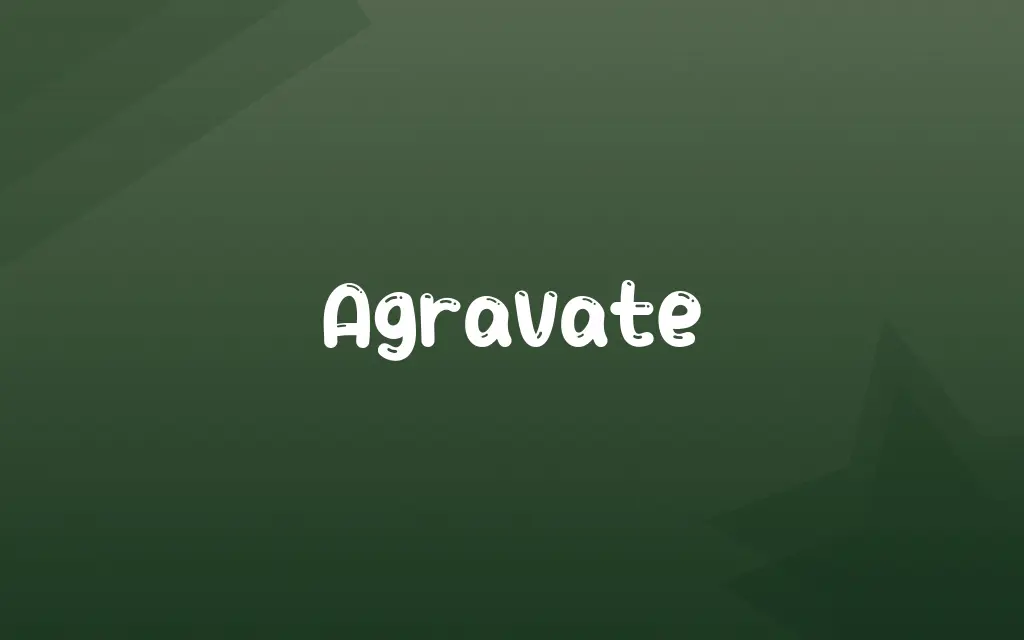Aggravate Definition, Meaning and Synonyms
By Muneeza Rehman & Muazma Batool — Updated on April 29, 2024
Discover the correct use of 'Agravate,' often mistakenly spelled as 'Aggravate,' and learn to distinguish between these frequently confused English words. Our guide offers insights and tips for accurate spelling and usage.

Aggravate Definitions
To worsen or intensify a condition or situation.
Loud noises can aggravate her migraines.
Muneeza Rehman
Jan 30, 2024
To exacerbate an already tense or difficult situation.
Bringing up old arguments will only aggravate our disagreement.
Muneeza Rehman
Jan 30, 2024
To cause to become more troublesome or complex.
Adding more data without proper analysis can aggravate the research problem.
Muneeza Rehman
Jan 30, 2024
To make more severe or intense, especially in law.
The use of a weapon can aggravate the charges in a criminal case.
Muazma Batool
Jan 30, 2024
To exacerbate an injury or illness.
Running on a sprained ankle will only aggravate the injury.
Maverick
Jan 30, 2024
To increase in seriousness or severity over time.
If left unchecked, the economic issues could aggravate into a crisis.
Smith
Jan 30, 2024
To annoy or irritate persistently.
His constant interruptions really aggravate me.
Eleanor
Jan 30, 2024
To provoke or incite to a higher degree.
His taunts were meant to aggravate his opponent.
Kalel
Jan 30, 2024
To make worse or more troublesome
Aggravate political tensions.
Aggravate a medical condition.
Muneeza Rehman
Jan 30, 2024
Aggravate Synonyms
Irritate
To make someone annoyed or impatient.
Loud noises tend to irritate him more than anything.
Muneeza Rehman
Apr 29, 2024
Intensify
To increase in degree, strength, or intensity.
The debate has intensified in recent weeks.
Muneeza Rehman
Apr 29, 2024
Annoy
To make someone feel slightly angry or impatient.
It annoys me when people don't reply to emails promptly.
Muneeza Rehman
Apr 29, 2024
Provoke
To stimulate or give rise to (a reaction or emotion, typically a strong or unwelcome one) in someone.
His remarks were sure to provoke outrage.
Bronson
Apr 29, 2024
Exacerbate
To increase the severity, bitterness, or violence of (disease, ill feeling, etc.); worsen.
Misunderstandings can exacerbate the conflict.
Muneeza Rehman
Apr 29, 2024
Inflame
To provoke or intensify (strong feelings, especially anger) in someone.
The article was intended to inflame public opinion.
Muneeza Rehman
Apr 29, 2024
Worsen
To become worse or make something worse.
The weather conditions worsened overnight.
Eleanor
Apr 29, 2024
Complicate
To make something more difficult or complex.
Adding more people to the project may complicate the process.
Kalel
Apr 29, 2024
Infuriate
To make (someone) extremely angry and impatient.
His dismissive attitude can infuriate even the calmest person.
Muneeza Rehman
Apr 29, 2024
Vex
To make someone feel annoyed, frustrated, or worried, especially with trivial matters.
The puzzle was sure to vex even the most patient participants.
Kalel
Apr 29, 2024
Aggravate Idioms
Aggravate the issue
To complicate or worsen an existing problem.
Trying to fix the software without proper knowledge might just aggravate the issue.
Muneeza Rehman
Feb 22, 2024
Aggravate the risk
To enhance the likelihood of a negative outcome.
Driving in this severe weather will only aggravate the risk of an accident.
Camila
Feb 22, 2024
Aggravate one's condition
To worsen someone's physical or mental state.
Skipping medication could aggravate one's condition significantly.
Muazma Batool
Feb 22, 2024
Aggravate the pain
To increase the intensity or severity of physical discomfort.
Walking without proper footwear might aggravate the pain in your heel.
Muneeza Rehman
Feb 22, 2024
Aggravate the situation
To make an already difficult situation even harder.
Arguing with the officer will only aggravate the situation.
Maverick
Feb 22, 2024
Aggravate the tension
To increase the stress or strain in a relationship or situation.
Bringing up past issues will only aggravate the tension between them.
Muneeza Rehman
Feb 22, 2024
Don't aggravate the matter
A warning to avoid making a situation worse.
Please stay calm and don't aggravate the matter with your complaints.
Muazma Batool
Feb 22, 2024
Aggravate the offense
In legal terms, to make a crime more serious by specific circumstances.
The presence of a weapon can aggravate the offense and lead to a harsher sentence.
Maverick
Feb 22, 2024
Aggravate the complexity
To make a problem or situation more complicated.
Adding more variables to the study will only aggravate the complexity of the analysis.
Xavier
Feb 22, 2024
Aggravate the divide
To intensify the disagreement or difference between groups.
Misinformation could aggravate the divide in the community.
Darian
Feb 22, 2024
Aggravate Meaning in a Sentence
The debate only served to aggravate tensions among the team.
Muneeza Rehman
Feb 22, 2024
I didn't mean to aggravate your injury with my suggestion.
Asaiah
Feb 22, 2024
The humidity seemed to aggravate the intensity of the heat.
Muneeza Rehman
Feb 22, 2024
He managed to aggravate the situation with his stubbornness.
Muneeza Rehman
Feb 22, 2024
His lack of empathy tended to aggravate every argument they had.
Muazma Batool
Feb 22, 2024
Delaying the decision may aggravate the uncertainty within the company.
Muneeza Rehman
Feb 22, 2024
Ignoring the problem will only aggravate it in the long run.
Bronson
Feb 22, 2024
Constant interruptions during the meeting only served to aggravate the participants.
Eleanor
Feb 22, 2024
Financial stress can often aggravate marital problems.
Muneeza Rehman
Feb 22, 2024
Frequently Asked Questions
What is the etymology of the word "aggravate"?
Aggravate originates from the Latin word "aggravare," which means to make heavy or to burden. It entered the English language in the early 15th century, initially referring to physical weight and later extending to mental and emotional burdens.
Muneeza Rehman
Feb 22, 2024
What is the difference between "aggravate" and "irritate"?
While both can refer to provoking annoyance or exasperation, "aggravate" often implies an intensification of an already problematic situation or condition, whereas "irritate" commonly refers to the act of causing annoyance or discomfort.
Muneeza Rehman
Feb 22, 2024
Is "aggravate" ever used in a positive context?
"Aggravate" is predominantly used in negative contexts to describe the worsening of a situation or condition. It is rarely, if ever, used positively.
Asaiah
Feb 22, 2024
How do I correctly use "aggravate" in a sentence?
Use "aggravate" to express the worsening of a situation, condition, or feeling. For example, "Constant interruptions can aggravate stress during work."
Muazma Batool
Feb 22, 2024
Is "aggravate" a formal or informal word?
"Aggravate" is considered formal and is appropriate for both written and spoken English in various contexts, including professional, academic, and legal settings.
Muazma Batool
Feb 22, 2024
Can "aggravate" be used in medical contexts?
Yes, "aggravate" is commonly used in medical contexts to describe the worsening of a condition, symptom, or disease. For example, "Certain foods can aggravate allergy symptoms."
Maverick
Feb 22, 2024
Does "aggravate" have different meanings in American and British English?
The primary meanings of "aggravate" are consistent in both American and British English, generally referring to making a situation worse or more serious.
Eleanor
Feb 22, 2024
Can "aggravate" be used in past tense?
Yes, "aggravate" can be used in the past tense as "aggravated." For example, "His comments aggravated the tension in the room."
Asaiah
Feb 22, 2024
What is the noun form of "aggravate"?
The noun form is "aggravation," which refers to the act of aggravating or the state of being aggravated.
Smith
Feb 22, 2024
How does the meaning of "aggravate" change with different prepositions, like "aggravate against" or "aggravate by"?
"Aggravate" typically pairs with prepositions like "by" or "with" to indicate the cause of aggravation, e.g., "aggravated by noise." It doesn't commonly pair with "against" in modern usage.
Darian
Feb 22, 2024
Can "aggravate" be used in a legal context?
Yes, "aggravate" is used in legal contexts to denote an increase in the seriousness or severity of a crime, often leading to stricter penalties. For example, "aggravated assault" is a more severe form of assault.
Kalel
Feb 22, 2024
How can I avoid confusing "aggravate" with similar words like "agitate"?
Remember that "aggravate" means to make a situation worse, while "agitate" means to stir up or disturb. Focus on the context of worsening or intensifying when using "aggravate."
Bronson
Feb 22, 2024
What are the common synonyms for "aggravate"?
Common synonyms include worsen, exacerbate, intensify, heighten, and compound.
Kalel
Feb 22, 2024
Are there any idiomatic expressions that use "aggravate"?
Yes, expressions like "aggravate the situation" or "aggravate the problem" are idiomatic, meaning to make a situation or problem worse.
Muneeza Rehman
Feb 22, 2024
What are the grammatical variations of "aggravate" (like adjective or adverb forms)?
While "aggravate" is a verb, its adjective form is "aggravating" (meaning annoying or worsening), and the adverb form is "aggravatingly." The noun form, as mentioned, is "aggravation."
Muneeza Rehman
Feb 22, 2024
Content Creators
Written by
Muneeza RehmanAt Definitions Wiki, Muneeza's commitment to clarity and precision extends beyond the realm of definitions. She believes that a thorough understanding of words empowers individuals to communicate effectively and appreciate the beauty of language in all its forms.
Co-written by
Muazma BatoolAs a copywriter, Muazma weaves words into a tapestry of compelling stories that capture hearts and minds. With a keen eye for detail and a mastery of language, she crafts messages that move people to action and create lasting impact.




























